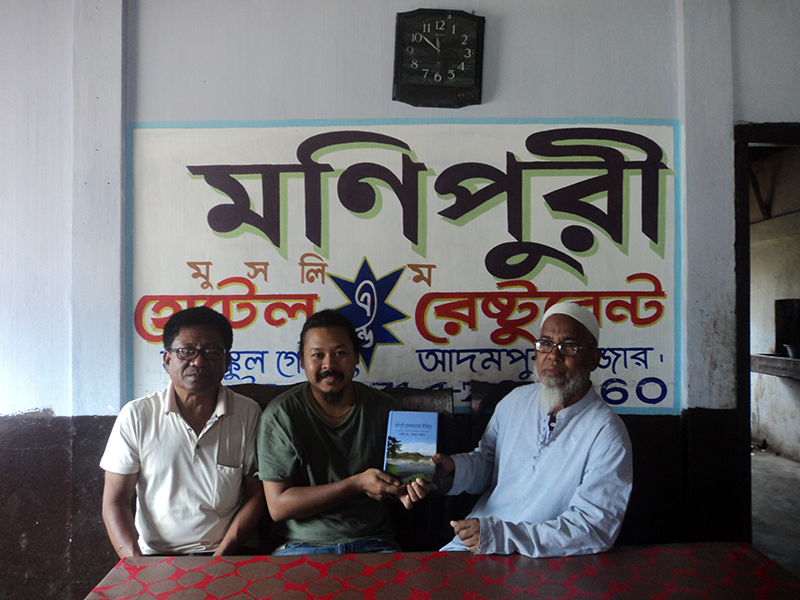Ronidkumar Chingangbam




Grant Period: one year and three months
Ronidkumar Chingangbam is a lyricist, singer and founder of the folk-rock band Imphal Talkies and The Howlers, and more popularly known by his stage name ‘Akhu’. Besides being a performer, Akhu has worked with children in Manipur on a music project called ‘A Native Tongue Called Peace’. His band, Imphal Talkies, was one of the 32 bands chosen from 32 countries by In Place of War and Unconvention for the Album of the Revolution. This grant supports the Imphal-based musician to create a musical performance based on notions of Manipuri identity that lie embedded in literature and folklore of the Meitei diaspora.
Of the 36 tribes that live in Manipur, the Meiteis have been considered the original inhabitants of the Imphal valley. However at various points in history, due to political unrest and war, large numbers of people from the Meitei community have left Manipur. In 1819, during the rule of king Marjit Singh, the Burmese invaded Manipur and finally occupied it in 1826. During these seven years, the Burmese went on a rampage causing large scale death and destruction in Manipur and left it in a state of utter chaos and anarchy. Many Manipuris were taken to Burma as slaves or to serve as soldiers in the army. Another exodus took place in the late 19th century, when war broke out between the British and the Manipuri king. Hundreds of people, including Akhu’s ancestors left Manipur and headed towards Sylhet in Bangladesh. They were never heard of again. At the same time, another group of Manipuris also migrated to Assam as workers in tea gardens under the colonial rule. For several centuries, Meiteis have also been settling in Tripura. Akhu, a Meitei himself, grew up in a joint family listening to these stories of migration from his grandparents. He heard from them about how their parents fled from Manipur during the air bombing of Imphal during the Second World War.
Much later when Akhu started reading Manipuri literature, he stumbled upon the writings of a few Meitei poets and writers from Bangladesh. Their stories and poems were a testament to their longing to return to the soil of their birth. Juxtaposed with the writings of Meiteis who currently live in Manipur, these writings of the diaspora, reveal interesting perspectives on how identities get erased, constructed or defined in relation to one’s socio-political contexts. Interestingly, a lot of literature has come out from the Meitei diaspora in Assam and Bangladesh. These stories and poems reveal a sense of affinity to the Meitei community in Manipur, heartbreak about conflicts that shatter their romantic idea of Manipur, and delve in nostalgia, remembrance of ancestors and an attempt to hark back to old Meitei rituals.
Present day Manipur has been torn by conflicts of different kinds – between the people and the state, between different ethnic groups and between local people. In this context, Akhu wishes to engage with, question, critique and understand the idea of Manipur and the Manipuri identity that lies embedded in literature and folklore of the Meitei diaspora. An understanding of this, Akhu feels, would enable him to engage with the current conflicts and work towards peace. The insider-outsider dimension provided by this literature, Akhu says, would also perhaps bring a self-realisation among the Meiteis about how they, as Manipur’s most dominant community, might have been a threat to other smaller tribal communities.
Enabled by this grant, Akhu will study diaspora literature on Manipur and understand it in terms of their geographical locations and perspectives. He will undertake extensive field trips to Silchar, Lakhipur, Hailakandi and Hojai in Assam, Sylhet in Bangladesh and to Tripura interviewing the diasporic Meitei community, understanding migration histories, perceptions of Manipur and their engagement with other communities in their current locations. He will collect folk songs and stories among the diaspora to see how different they are from those back in Manipur. He will also explore different kinds of musical expressions and instruments prevalent among the diaspora. This research will provide material for Akhu to write and compose new songs.
The outcome of this project will be a musical performance. This performance will have songs written and composed by Akhu as well as songs derived from Manipuri diaspora literature. For creating this piece, Akhu plans to collaborate with other poets and artists. The performance is scheduled to premiere in Imphal in October 2018. An audio CD containing about 10 – 12 songs created as part of this project will also be produced. The audio CD along with still and video documentation from his field trips and his premiere performance will be Akhu’s deliverables to IFA.
